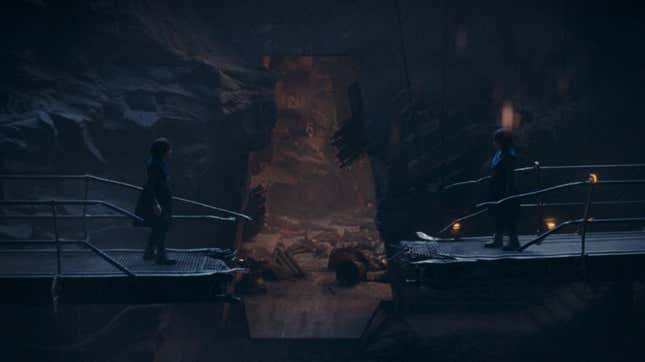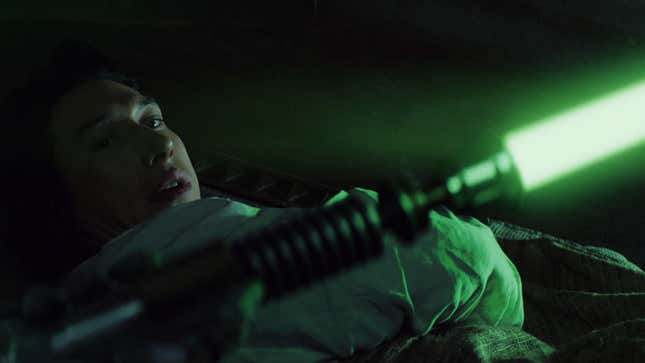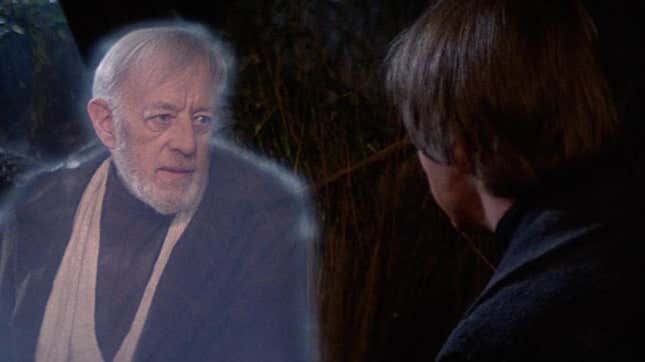The third episode of The Acolyte is pretty incredible for a lot of reasons. It’s an episode that, in content, invites us to consider new perspectives on some of the saga’s most fundamental spiritual ideas, and delivers a meaty slice of back story for its protagonists and antagonists alike. But it also does something quite remarkable for Star Wars: it asks us to not make the assumption that what we are watching is the whole truth.

Advertisement
“Destiny” puts a pause on the present story of The Acolyte and its Jedi murder-mystery to flash back 16 years to explore Osha and Mae Aniseya’s upbringing on the planet Brendok as part of a coven of witches, and the tragic circumstances that tore their family apart—leaving Mae to her seeming death, and Osha recruited by a group of Jedi. But the episode is never framed explicitly as recollection by either sister: the episode starts and we are already 16 years in the past on Brendok, the episode ends and the credits roll. We never come back to the present to be told how what we’re being shown in flashback is being delivered to us. The episode leaves plenty of clues for the audience just who’s perspective we’re getting—it’s Osha whose interiority and perspective we most closely follow throughout the episode—but it asks the audience itself to intuit that, instead of flat-out saying so.

Advertisement
And in doing that, it also asks the audience to go a step further: that it also has to realize that what it is watching is one perspective, steeped in bias, that that perspective does not have the entire picture of events. There are things about “Destiny” that are not clear from one moment the next, things that don’t match up with what we’re being told about events that occur—like how we’re told the accident that leads to the coven being wiped out save for Osha is a “simple” fire, but what we see through the young Osha’s perspective is something far more devastating and involved than that fire could have ever been, resulting in piles of strewn witch bodies.
We come out of the episode with a better understanding of Osha’s backstory, and her sister’s, and the reasons why they both are on the paths they are on 16 years later. But at the same time we still come out of it with a lot of questions—not just for the things we don’t see in this set of flashbacks, but with questions about the perspective behind what we do see. The Acolyte wants us to recognize that it is more than not just giving the full picture here, but that we are getting one specific perspective of that picture, a perspective that is inherently built from recollections shaped by bias and perception. That, at some point in its story further down the line, there is a chance we will see another telling of this event that changes things we thought we knew, or adds context to them, or adds new things in turn—and that that telling in and of itself is also just one perspective shaped by its own set of perceived biases. Just as Star Wars has long worn its inspirations from Akira Kurosawa’s The Hidden Fortress on its sleeve, it’s Star Wars through the vector of another Kurosawa film in turn: Rashomon, the 1950 classic about the murder of a Samurai, recounted to the audience through multiple contradictory and subjective retellings of the event. Rashomon’s international success and appraisal saw the film go on to give name to the Rashomon Effect, the storytelling method of acknowledging the unreliability of narrators and eyewitnesses by offering different interpretations of the same events.
Advertisement

And it is a narrative device that is extremely rare for Star Wars. It’s not entirely new of course—there’s direct parallels you can draw between “Destiny” and The Last Jedi, for example, for how we see alternate recollections of the night Luke Skywalker’s Jedi Academy was destroyed, the moment he almost struck his own nephew down out of fear of the Dark Side within him. There’s also the nature of Star Wars’ broad story being one that we’ve learned out of order, and how further context has shaped and changed things we thought we knew. We went from the original trilogy, to the prequels, and then to the sequels years later—and now all the way around and in between those sets of movies, we have shows, comics, and books that have provided explanations or ways to bridge characters and events across that whole period of the Skywalker saga. The very act of building a definitive canon, especially in the era of Lucasfilm’s ownership under Disney and the decision to completely re-overhaul Star Wars continuity back to the source point of what would become nine original films, is inherently about this, as we constantly learn new information that contradicts or re-contextualizes what came before.
Advertisement
But that’s also what makes doing something like this—offering us a telling of an event for the first time in one hand, and implicitly asking us in the process to immediately not believe it as an entirely true telling—so rare and fraught in the first place. For better or worse, the modern era of Star Wars, and a lot of its fandom along the way, has been taught that canon is king. That every new show, book, movie, comic, video game, whatever, that is coming out, is part of this singular, defined canon. Inadvertently or otherwise, its audience has been taught to take the narratives it is offered and break them down into a set of rules about the way Star Wars’ world works, into the raw facts about characters and events, and that those things are unequivocally true: because they have to be, to fit into this new canonical definition of what Star Wars is as an entire universe. The facts are almost as fundamental to its existence as a franchise as whatever narrative embellishments are made weaving those facts into the universe in the first place.

Advertisement
Even if, as we’ve said, Star Wars has always been built on half-truths and myths since its very beginning—it is a franchise that can treat the phrase “from a certain point of view” as akin to being as much as a catchphrase as “may the Force be with you” is—the audience has been taught to expect that whatever narrative is being laid out to them in new material is by and large to be trusted as true within the context of Star Wars’ fundamental canon. It’s what makes these moments where a particular story decides to challenge that idea not only so rare and exciting, but also deeply controversial to a lot of people—it’s not something we are often asked of by Star Wars, even if it is a common storytelling device. It’s unfair to seemingly hoodwink an audience that is not used to being hoodwinked, for good or ill, after all. You can’t teach that audience to treat everything as facts to be learned and categorized and then suddenly start telling them that not all of those facts are necessarily correct—there has to be a certain amount of faith on both parties before you can experiment like that.
But a galaxy far, far away that asks us to take such ideas into account—that there are many perspectives and ideas to consider about the stories we’re told, that there is potential in being open to being mistrusting sometimes, not due to some narrative failure but so we can broaden our interpretation—is one that is far stronger, and more interesting, than one that isn’t, simply through the sheer potential it opens Star Wars to from a storytelling standpoint. If Star Wars can be anything, then sometimes it can also be untrue… from a certain point of view.
Advertisement
Want more io9 news? Check out when to expect the latest Marvel, Star Wars, and Star Trek releases, what’s next for the DC Universe on film and TV, and everything you need to know about the future of Doctor Who.
Services Marketplace – Listings, Bookings & Reviews